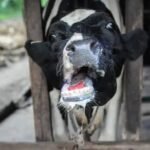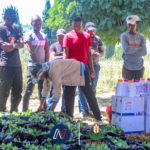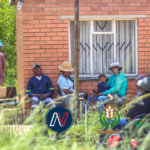From nutritional benefits to economic potential, Dr. Pulane Nkhabutlane is championing the soybean as a “super bean” capable of transforming the welfare of Basotho and the broader Southern African region.
Working in collaboration with Professor Motlatsi Morojele, an agronomist, and Dr. Moleboheng Lekota, a plant pathologist, the team initiated a soybean research project in 2022 with support from the Agricultural Productivity Program for Southern Africa (APPSA).
According to the World Health Organization, malnutrition refers to deficiencies or excesses in nutrient intake, imbalance of essential nutrients, or impaired nutrient utilisation. It includes undernutrition, over-nutrition, and diet-related non-communicable diseases.
In countries like Lesotho, which face numerous developmental challenges, the triple burden of malnutrition—undernutrition, over-nutrition, and micronutrient deficiencies—remains a serious concern.
A World Food Programme report reveals that 36 percent of children under five and 34 percent of adults in Lesotho are affected by malnutrition.
Dr. Nkhabutlane attributes this to the country’s dietary staples—wheat bread and maize meal—which she notes offer little nutritional value.
To assess the potential of soybeans in addressing this issue, the researchers focused on their effects on nutrition, physicochemical properties, sensory characteristics, and consumer acceptance.
The study included farmers and consumers, allowing for feedback across the soybean value chain.
“Nutrition begins from the choice of seeds, to the management of nutrients in the soil. Then the nutrition the bean carries will be optimised,” explained Dr. Moleboheng Lekota when presenting their findings at the recent APPSA and CCARDESA conference in Maseru.
She emphasised that soybean surpasses all other beans in nutritional value, particularly in protein content, hence its designation as a “super bean.”
The team introduced soybeans into five districts; Leribe, Butha-Buthe, Mafeteng. Mohale’s Hoek and Quthing, however, they noted that soybeans require significant moisture and do not perform well in arid areas or regions with poor irrigation.
The experiment led to the development of various soybean-based products, including; Soy flour for bread, Soy meal (pap), Soy coffee, Soy cooking oil, Soy milk, Split beans, Roasted beans and Animal feed.
They said the varieties introduced were tailored to appeal to farmers, consumers, and retailers. Feedback from participants revealed a strong preference for soy products.
“The participants of the experiment said soy bread has a milky and creamy taste, and more than half of our subjects said they are not going to use maize meal and wheat bread anymore.
“What I usually suggest is that consumers mill the soy together with what they already use. This way, soy becomes both an economically convenient supplement to wheat flour for bread, maize meal for pap, and sorghum flour for porridge. The adaptability rate of the consumers has been positive,” said Dr. Nkhabutlane.
She noted that Basotho’s response to soybean has been encouraging. The simplicity of recipes using soybeans is giving hope to small-scale and family farmers who seek both nutrition and profit.
Globally, South Africa is a key soybean exporter, contributing 0.7% of global soybean production and nearly 40% of Africa’s total, according to the United States Department of Agriculture.
Other SADC members—Tanzania, Zambia, Uganda, and Zimbabwe—have also expanded soybean production.
“The soybean seed has been successful in the areas of experiment meaning that Lesotho can capacitate high yields of soy enough to feed the entire country,” Dr. Nkhabutlane said.
Beyond nutrition, soybeans offer health benefits, including reducing the risk of cancer due to their high levels of antioxidants.
“Illnesses like breast cancer and prostate cancer can be prevented—or if present, the soybean-rich diet can reduce the rate at which the cancer spreads to the body,” she explained, citing it does not heal cancer but it alleviates the growth rate.
She added that chronic conditions such as high blood pressure, arthritis, stroke, diabetes, obesity, heart disease, and constipation can all be prevented or managed through soybean consumption.
While soybeans remain relatively unfamiliar to many in Lesotho, the research team is confident that, through the ongoing support of APPSA Lesotho and the training of farmers and consumers across the five districts, soybeans will gain popularity in both farming and household economies.
She asserted, “Importantly, soybean is resistant to the bruchid beetle, a common pest, due to its hard seed membrane, ensuring high-quality yields both before and after harvest.”








